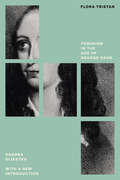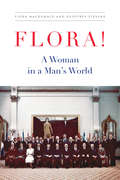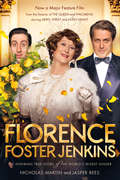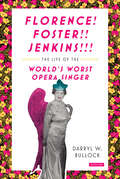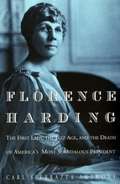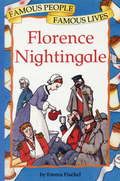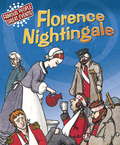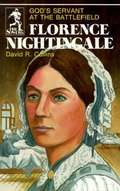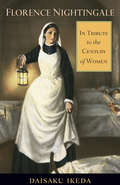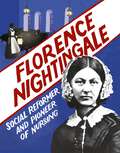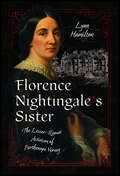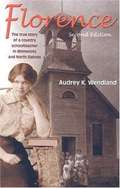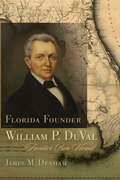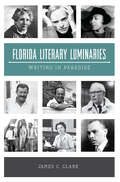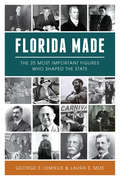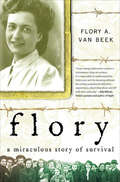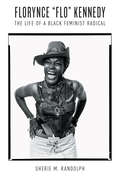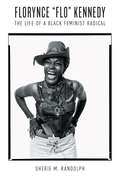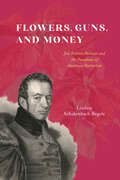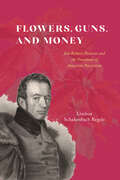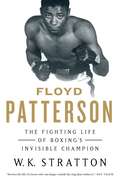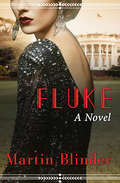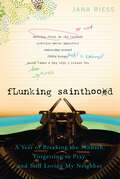- Table View
- List View
Flora Tristan: Feminism In The Age Of George Sand
by Sandra DijkstraA new edition of an influential biography of the early Victorian socialist feminist writer Flora Tristan.Active in the 1830s and 1840s, Flora Tristan is best known for her book "Workers' Union," an account of the conditions of women and workers in Peru, London, Paris and the provinces of France. Regarded as something of a pariah, she was one of the first women radicals to draw clear connections between the plight of disaffected workers and powerless women. Her version of socialism has been regarded as leading towards Marx. Sandra Dijkstra aims to paint a clear picture of Tristan as a class- and gender-conscious women writer in a transitional historical period, and to demonstrate her influence on Marxism.
Flora!: A Woman in a Man's World
by Geoffrey Stevens Flora MacDonaldFlora Isabel MacDonald – politician, humanitarian, adventurer, and role model for a generation of women – was known across Canada and beyond simply as Flora. In her memoir, co-authored by award-winning journalist and author Geoffrey Stevens, she tells her personal story for the very first time.Flora! describes her amazing journey from her childhood and her time at secretarial school in Cape Breton, through her years in backroom Progressive Conservative politics, to elected office and her appointment as Canada’s first female minister of foreign affairs. Finally, she details her exceptional humanitarian work in India and in war-torn Africa and Afghanistan. Flora was driven by a lifelong conviction that there is nothing a woman cannot achieve in a world controlled by men, and she pursued this conviction in everything she did, carving a path for women in Parliament. She won international acclaim for bringing 60,000 Vietnamese refugees to Canada, and for engineering the rescue of six American hostages in Tehran in a top-secret collaboration with the CIA known as the Canadian Caper. She exposed the inhumane treatment of inmates at Kingston’s Prison for Women. She defied male chauvinists in the Progressive Conservative party by running for its leadership, and she introduced the Employment Equity Act to guarantee women equal access to federal jobs.Flora was brave. She was relentless. She was controversial. She was a force of nature. In her own words and drawing from interviews with those who knew her, Flora! grants us insight into this exceptional woman who changed the course of history.
Florence Foster Jenkins: The Inspiring True Story of the World's Worst Singer
by Jasper Rees Nicholas MartinFlorence Foster Jenkins was the most famous, though untalented, soprano in twentieth century America. Her extraordinary story is now a film directed by Stephen Frears starring Meryl Streep as the indomitable Florence Foster Jenkins and Hugh Grant as her husband/manager, St. Clair Bayfield. In this full-length biography tie-in to the film, Nicholas Martin, the scriptwriter, and Jasper Rees take a deeper look at her life and times. Born in Wilkes-Barre, Pennsylvania in 1868, Florence adored music, but her wealthy father refused to allow her to study in Europe. In 1909, she inherited a considerable sum of money when her father died. It was then that she began to take singing lessons, vowed to become a great soprano and met St Clair Bayfield. At seventy six, after a lifetime supporting classical music societies and giving self-financed recitals, she gave a solo concert at Carnegie Hall that drew Cole Porter, Gypsy Rose Lee and other luminaries to the sold-out hall. It was a night to remember. Florence felt she had triumphed, but the crowd roared with laughter. After a lifetime of singing to entertain others, she didn't know the one thing that everyone else did and that St. Clair Bayfield kept from her: she had a terrible voice and couldn't sing a note. Florence Foster Jenkins is the book everyone will be reading after Meryl Streep brings this unintentionally funny and ultimately heartbreaking American woman to life.
Florence Foster Jenkins: The Life of the World's Worst Opera Singer
by Darryl W. BullockFinally, a biography of Florence Foster Jenkins, considered the world's worst opera singer, soon to be portrayed by Meryl Streep in the forthcoming film. "Probably the most complete and absolute lack of talent ever publicly displayed." --Life Magazine Madame Jenkins couldn't carry a tune in a bucket: despite that, in 1944 at the age of 76, she played Carnegie Hall to a capacity audience and had celebrity fans by the score. Her infamous 1940s recordings are still highly-prized today. In his well-researched and thoroughly entertaining biography, Darryl W. Bullock tells of Florence Foster Jenkins meteoric rise to success and the man who stood beside her, through every sharp note. Florence was ridiculed for her poor control of timing, pitch, and tone, and terrible pronunciation of foreign lyrics, but the sheer entertainment value of her caterwauling packed out theatres around the United States, with the 'singer' firmly convinced of her own talent, partly thanks to the devoted attention for her husband and manager St Clair Bayfield. Her story is one of triumph in the face of adversity, courage, conviction and of the belief that with dedication and commitment a true artist can achieve anything.
Florence Harding: The First Lady, the Jazz Age and the Death of America's Most Scandalous President
by Carl Sferrazza AnthonyTells the story of Florence Harding's rise from young unwed mother to First Lady and reveals her influence behind Harding's ascent to America's most scandal-ridden presidency and her role in his death. The drama of her life is set against the stage of the White House in the Jazz Age, and involves exciting elements such as mistresses, blackmail, poisoning, and opium addicts.
Florence Nightingale (Famous People, Famous Lives #5)
by Emma FischelExciting stories about famous people, outlining their lives and the important events which made them memorable. Every page features easy-to-follow text and a black-and-white line drawing to help bring these events to life. Each title gives further facts about the famous person and the times in which he or she lived, plus a comprehensive time line detailing key dates. Florence Nightingale tells the story of how this Victorian woman defied her family and friends to take up the unpopular profession of nursing and changed the way hospitals were run.
Florence Nightingale (Famous People, Great Events #4)
by Emma FischelRead about the life of this extraordinary woman. Florence Nightingale was lucky. Her wealthy parents encouraged her to travel, to go to parties and, one day soon, to marry. But Florence had different plans. She wanted to be a nurse and no one was going to stop her.This book is part of a series of picture books, Famous People, Great Events, which are suitable for ages 6-12. They tell the stories of famous men and women and great events in history. Written by successful authors, they are enjoyable reads which are packed with facts and colourful illustrations.Each book includes a timeline of key dates, a quiz and index.
Florence Nightingale: Famous People, Famous Lives
by Emma FischelExciting stories about famous people, outlining their lives and the important events which made them memorable. Every page features easy-to-follow text and a black-and-white line drawing to help bring these events to life. Each title gives further facts about the famous person and the times in which he or she lived, plus a comprehensive time line detailing key dates. Florence Nightingale tells the story of how this Victorian woman defied her family and friends to take up the unpopular profession of nursing and changed the way hospitals were run.
Florence Nightingale: Famous People, Great Events
by Emma FischelRead about the life of this extraordinary woman. Florence Nightingale was lucky. Her wealthy parents encouraged her to travel, to go to parties and, one day soon, to marry. But Florence had different plans. She wanted to be a nurse and no one was going to stop her.This book is part of a series of picture books, Famous People, Great Events, which are suitable for ages 6-12. They tell the stories of famous men and women and great events in history. Written by successful authors, they are enjoyable reads which are packed with facts and colourful illustrations.Each book includes a timeline of key dates, a quiz and index.
Florence Nightingale: God's Servant at the Battlefield
by David R. CollinsA biography of the well-to-do woman who defied social convention in order to establish nursing as a respectable career for women, and bring about reforms in hospital conditions and nursing care.
Florence Nightingale: In Tribute to the Century of Women
by Daisaku IkedaFlorence Nightingale exemplified the incredible strength and capacity of a person fully awakened to her life's mission. Drawing inspiration from her life, eminent Buddhist philosopher and teacher Daisaku Ikeda shares insights that provide valuable lessons for men and women in today's world.
Florence Nightingale: Social Reformer and Pioneer of Nursing (History Makers Ser.)
by Sarah RidleyPerfect for children aged 8+, this accessible biography of Florence Nightingale's life shows us why we still remember her today - 200 years after her birth (May 1820). Not only did Florence improve the lives of British soldiers wounded in the Crimean War, but as a professional and hard-working, extremely clever public-health reformer she led the establishment of a training school for nurses, better designed hospitals, improved sanitation and the idea of healthcare for all (leading eventually to the NHS). All this at a time when girls and women were expected to live their lives in the private sphere of marriage and home. The book is packed with images of objects, photographs and sketches to illuminate her life story, including her pet owl, her wooden lunchbox and her travelling medicine chest. Then there are her books, and her endless lists and reports (she was fantastic with statistics), and of course the famous Turkish lantern she bought from a market in Istanbul and used to light her way down the corridors and wards of the military hospital at Scutari.
Florence Nightingale’s Sister: The Lesser-Known Activism of Parthenope Verney
by Lynn HamiltonThey say that behind every great man is a hard-working woman. Behind the titanic that was Florence Nightingale, there was a lesser-known sister, Frances Parthenope. While Florence achieved iconic fame for her work with wounded soldiers in the Crimea, Parthenope spent her days gathering supplies for those same soldiers, especially the ever-needed dry socks, and sending them overseas. With hands badly damaged by rheumatic fever, Parthenope tirelessly penned letters to Florence’s supporters and tactfully requested donations. Eventually, Parthenope married and turned her writing talents to fiction and non-fiction that exposed Victorian injustices toward the poor and women. Florence Nightingale’s older sister never achieved the fame that came to the “Lady of the Lamp.” However, in her own right, Frances Parthenope Verney was a great Victorian. A novelist, journalist, and activist, she supported her sister’s reform of the medical profession while being a thought influencer on the subject of the urban poor and the British peasantry.
Florence: The True Story of a Country Schoolteacher in Minnesota and North Dakota (second ed.)
by Audrey K. WendlandThe year is 1912 when seventeen-year-old Florence Thompson takes on her first job as a teacher at District 34, the worst country school in Swift County. This is the story of her triumphs and tribulations, living among the Norwegian immigrants in Minnesota during the horse-and-buggy era. It will bring chuckles in the heart to former schoolteachers everywhere. Audrey Wendland, a daughter of Florence, is a freelance writer with credits in a variety of magazines such as Coed, Army Times and Viking, published by the Sons of Norway. Her hobby is genealogy and she draws upon this knowledge to create a picture of life as it was lived in Swift County, and later in Bowman County, North Dakota when Florence decides to cast her lot with the homesteaders. (From the book jacket.)
Florida Founder William P. DuVal: Frontier Bon Vivant
by James M. DenhamThe first full-length biography of the well-connected, but nearly forgotten frontier politician of antebellum America.The scion of a well-to-do Richmond, Virginia, family, William Pope DuVal (1784–1854) migrated to the Kentucky frontier as a youth in 1800. Settling in Bardstown, DuVal read law, served in Congress, and fought in the War of 1812.In 1822, largely because of the influence of his lifelong friend John C. Calhoun, President James Monroe appointed DuVal the first civil governor of the newly acquired Territory of Florida. Enjoying successive appointments from the Adams and Jackson administrations, DuVal founded Tallahassee and presided over the territory’s first twelve territorial legislative sessions, years that witnessed Middle Florida’s development into one of the Old Southwest’s most prosperous slave-based economies. Beginning with his personal confrontation with Miccosukee chief Neamathla in 1824 (an episode commemorated by Washington Irving), DuVal worked closely with Washington officials and oversaw the initial negotiations with the Seminoles.A perennial political appointee, DuVal was closely linked to national and territorial politics in antebellum America. Like other “Calhounites” who supported Andrew Jackson’s rise to the White House, DuVal became a casualty of the Peggy Eaton Affair and the Nullification Crisis. In fact he was replaced as Florida governor by Mrs. Eaton’s husband, John Eaton. After leaving the governor’s chair, DuVal migrated to Kentucky, lent his efforts to the cause of Texas Independence, and eventually returned to practice law and local politics in Florida. Throughout his career DuVal cultivated the arts of oratory and story-telling—skills essential to success in the courtrooms and free-for-all politics of the American South. Part frontiersman and part sophisticate, DuVal was at home in the wilds of Kentucky, Florida, Texas, and Washington City. He delighted in telling tall tales, jests, and anecdotes that epitomized America’s expansive, democratic vistas. Among those captivated by DuVal’s life and yarns were Washington Irving, who used DuVal’s tall tales as inspiration for his “The Early Experiences of Ralph Ringwood,” and James Kirke Paulding, whose “Nimrod Wildfire” shared Du Val’s brashness and bonhomie.“In large brushstrokes, but with great attention to detail, Denham embeds DuVal’s life in a wider portrait of the young Republic, and particularly in issues affecting the western states and the former Spanish borderlands Readers will find in this book a well-researched and well-written history that informs on many levels.” —The Historian“Relying on a variety of sources extending well beyond DuVal’s papers, Denham’s work provides an intriguing account of a southerner immersed in the dynamics of politics at both the local and national levels. The study will be a definitive must for any student of antebellum regional and national history.” —The Journal of Southern History
Florida Literary Luminaries: Writing in Paradise
by James C. ClarkSit down for a spell with the bevy of famed writers who've found inspiration in the Florida sun. From the Spanish explorer Cabeza de Vaca to James Patterson, writers have found inspiration in the Florida sunshine. Ernest Hemingway met his future wife at Sloppy Joe's in Key West. John Kennedy recovered from back surgery in Palm Beach while working on his Pulitzer Prize winning book. James Weldon Johnson wrote what became The Negro National Anthem at the Stanton School in Jacksonville. And Edna St. Vincent Millay watched in shock as her manuscript went up in flames in Sanibel. Florida historian James Clark tells the stories of scores of writers including Robert Frost, Jack Kerouac, John D. MacDonald, and Stephen King. Hunter Thompson driving through the streets of Key West using a bullhorn to warn the citizens, Tennessee Williams partying with Truman Capote, Ring Lardner planning a get together with Al Capone--it's all here.
Florida Made: The 25 Most Important Figures Who Shaped the State
by Laura E. Mize George S. LeMieuxFlorida is in many ways both the oldest and newest of the megastates. Once an insect-ridden swampland, it is now a top destination for tourism, business, agriculture and innovation. The ideas and actions of a colorful cast of characters--from beloved cultural icons to political heroes and even a socialist dictator--transformed the peninsula. A Barbados native rescued Florida's orange industry after the catastrophic 1835 freeze. Known as the "Grande Dame of the Everglades," Marjory Stoneman Douglas worked tirelessly to save the state's vast, incomparable wetlands from annihilation in the early twentieth century. In the mid-1800s, a Florida doctor developed a precursor to modern air conditioning. Join former U.S. senator George LeMieux and journalist Laura Mize as they profile and rank, according to impact, the twenty-five trailblazers who have changed the state forever.
Flory: Survival in the Valley of Death
by Flory Van BeekIn 1939, as the Nazi occupation grew from threat to reality, the Jewish population throughout Europe faced heart-wrenching decisions—to flee and lose their homes or to go into hiding, hoping against all odds to avoid the fate of being discovered. Holocaust survivor Flory A. Van Beek faced this terrible choice, and in this poignant testament of hope she takes us on her personal journey into one of history's darkest hours.Only a teenage girl when the Nazis invaded her neutral homeland of Holland, Flory watched the only life she had ever known disappear. Tearfully leaving her family, Flory tried to escape on the infamous SS Simon Bolivar passenger ship with Felix, the young Jewish man from Germany who would later become her husband. Their voyage brought not safety but more peril as their ship was blown up by Nazi planted mines, one of the first passenger ships destroyed by the Germans during World War II, sending nearly all of its passengers to a watery end. Miraculously, both Flory and Felix survived.After recovering from their injuries in England, they returned to their homeland, overjoyed to be reunited with their families yet shocked to discover their beloved Holland a much-changed place. As the Nazi grip tightened, they were forced into hiding. Sheltered by compassionate strangers in confined quarters, cut off from the outside world and their relatives, they faced hunger and the stress of daily life shadowed by the ever-present threat of certain death. Yet they also discovered, with the remarkable and brave families who sacrificed their own safety to help keep Flory and Felix alive, a set of friends that remain as close as family to this day.A tribute to family, faith, and the power of good in the face of disparate evil, this gripping account captures the terror of the Holocaust, the courage of those who risked their lives to protect their fellow compatriots, and the faith of those who, against all odds, managed to survive.
Florynce "Flo" Kennedy: The Life of a Black Feminist Radical (Gender and American Culture)
by Sherie M. RandolphOften photographed in a cowboy hat with her middle finger held defiantly in the air, Florynce "Flo" Kennedy (1916–2000) left a vibrant legacy as a leader of the Black Power and feminist movements. In the first biography of Kennedy, Sherie M. Randolph traces the life and political influence of this strikingly bold and controversial radical activist. Rather than simply reacting to the predominantly white feminist movement, Kennedy brought the lessons of Black Power to white feminism and built bridges in the struggles against racism and sexism. Randolph narrates Kennedy's progressive upbringing, her pathbreaking graduation from Columbia Law School, and her long career as a media-savvy activist, showing how Kennedy rose to founding roles in organizations such as the National Black Feminist Organization and the National Organization for Women, allying herself with both white and black activists such as Adam Clayton Powell, H. Rap Brown, Betty Friedan, and Shirley Chisholm.Making use of an extensive and previously uncollected archive, Randolph demonstrates profound connections within the histories of the new left, civil rights, Black Power, and feminism, showing that black feminism was pivotal in shaping postwar U.S. liberation movements.
Florynce “Flo” Kennedy
by Sherie M. RandolphOften photographed in a cowboy hat with her middle finger held defiantly in the air, Florynce "Flo" Kennedy (1916-2000) left a vibrant legacy as a leader of the Black Power and feminist movements. In the first biography of Kennedy, Sherie M. Randolph traces the life and political influence of this strikingly bold and controversial radical activist. Rather than simply reacting to the predominantly white feminist movement, Kennedy brought the lessons of Black Power to white feminism and built bridges in the struggles against racism and sexism. Randolph narrates Kennedy's progressive upbringing, her pathbreaking graduation from Columbia Law School, and her long career as a media-savvy activist, showing how Kennedy rose to founding roles in organizations such as the National Black Feminist Organization and the National Organization for Women, allying herself with both white and black activists such as Adam Clayton Powell, H. Rap Brown, Betty Friedan, and Shirley Chisholm.Making use of an extensive and previously uncollected archive, Randolph demonstrates profound connections within the histories of the new left, civil rights, Black Power, and feminism, showing that black feminism was pivotal in shaping postwar U.S. liberation movements.
Flowers, Guns, and Money: Joel Roberts Poinsett and the Paradoxes of American Patriotism (American Beginnings, 1500-1900 Ser.)
by Lindsay Schakenbach RegeleA fascinating historical account of a largely forgotten statesman, who pioneered a form of patriotism that left an indelible mark on the early United States. Joel Roberts Poinsett’s (1779–1851) brand of self-interested patriotism illuminates the paradoxes of the antebellum United States. He was a South Carolina investor and enslaver, a confidant of Andrew Jackson, and a secret agent in South America who fought surreptitiously in Chile’s War for Independence. He was an ambitious Congressman and Secretary of War who oversaw the ignominy of the Trail of Tears and orchestrated America’s longest and costliest war against Native Americans, yet also helped found the Smithsonian. In addition, he was a naturalist, after whom the poinsettia—which he appropriated while he was serving as the first US ambassador to Mexico—is now named. As Lindsay Schakenbach Regele shows in Flowers, Guns, and Money, Poinsett personified a type of patriotism that emerged following the American Revolution, one in which statesmen served the nation by serving themselves, securing economic prosperity and military security while often prioritizing their own ambitions and financial interests. Whether waging war, opposing states’ rights yet supporting slavery, or pushing for agricultural and infrastructural improvements in his native South Carolina, Poinsett consistently acted in his own self-interest. By examining the man and his actions, Schakenbach Regele reveals an America defined by opportunity and violence, freedom and slavery, and nationalism and self-interest.
Flowers, Guns, and Money: Joel Roberts Poinsett and the Paradoxes of American Patriotism (American Beginnings, 1500-1900)
by Lindsay Schakenbach RegeleA fascinating historical account of a largely forgotten statesman, who pioneered a form of patriotism that left an indelible mark on the early United States. Joel Roberts Poinsett’s (1779–1851) brand of self-interested patriotism illuminates the paradoxes of the antebellum United States. He was a South Carolina investor and enslaver, a confidant of Andrew Jackson, and a secret agent in South America who fought surreptitiously in Chile’s War for Independence. He was an ambitious Congressman and Secretary of War who oversaw the ignominy of the Trail of Tears and orchestrated America’s longest and costliest war against Native Americans, yet also helped found the Smithsonian. In addition, he was a naturalist, after whom the poinsettia—which he appropriated while he was serving as the first US ambassador to Mexico—is now named. As Lindsay Schakenbach Regele shows in Flowers, Guns, and Money, Poinsett personified a type of patriotism that emerged following the American Revolution, one in which statesmen served the nation by serving themselves, securing economic prosperity and military security while often prioritizing their own ambitions and financial interests. Whether waging war, opposing states’ rights yet supporting slavery, or pushing for agricultural and infrastructural improvements in his native South Carolina, Poinsett consistently acted in his own self-interest. By examining the man and his actions, Schakenbach Regele reveals an America defined by opportunity and violence, freedom and slavery, and nationalism and self-interest.
Floyd Patterson: The Fighting Life of Boxing's Invisible Champion
by W. K. Stratton"Stratton offers boxing fans a solidly researched, popularly written study of a complex, good man. A clear winner." —Library Journal (starred) "Stratton’s attention to detail is impressive, and he seems to have uncovered every little tidbit about Patterson's life both in and out of the ring, making this warm biography a must for boxing fanatics. An engaging, breezy portrait of an underappreciated boxing giant." —Kirkus Reviews A "deftly written autobiography...Stratton reminds us of Floyd Patterson's remarkable talent, mortality, and determination."—Publisher's Weekly "An even-handed, surprisingly readable account of one of America’s neglected sports figures."—Booklist "A well-researched and overdue tribute to Floyd Patterson. Like one of Patterson's reliable left hooks, Stratton sharply recounts the life of an important, but often forgotten, two-time world heavyweight champion." —Gary Andrew Poole, author, PacMan: Behind The Scenes With Manny Pacquiao—The Greatest Pound-for-Pound Fighter in the World "Stratton provides some fascinating insight into, surely, the most inscrutable heavyweight champion we've ever had. His book about Floyd Patterson is comprehensive and sensitive, as it seeks to help us understand a man who seemed so temperamentally in contradiction to his profession." —Frank Deford, author of Over Time and Everybody's All-American "Floyd Patterson was one of the more beguiling and hypnotic figures to stride across the stage of twentieth-century boxing. W. K. Stratton tells the story of this proud and mannered man with insight and artful compassion." —Wil Haygood, author of Sweet Thunder: The Life and Times of Sugar Ray Robinson "W. K. Stratton's Floyd Patterson revives the life of a boxer who was larger outside the ring than within it, a boxer who had a heart and humanity (and courage) beyond what his fight record revealed. He overcame obstacles and persevered in a manner that his more ferocious opponents did not." —Gay Talese, author of A Writer's Life and The Silent Season of a Hero "The extant literature on Floyd Patterson had heretofore been the province of often-fawning admirers, but with Floyd Patterson, W. K. Stratton has managed to produce a refreshingly honest and even-handed deconstruction of the owner of the uneasiest head to wear a crown this side of Henry IV." —George Kimball "A knockout biography of the best boxer in 1950s and early 1960s America. From winning an Olympic Gold medal to developing the peek-a-boo stance that influenced Muhammad Ali, Patterson was a monumental influence on the boxing profession during its Cold War era heyday. Highly recommended!" —Douglas Brinkley, bestselling biographer and professor of history at Rice University —
Fluke: A Novel
by Martin BlinderPresident Harding&’s young mistress narrates her life in the shadows of political corruption in this historical novel &“of considerable dash and charm&” (Publishers Weekly, starred review). President Warren G. Harding was a strikingly handsome man with little political ambition. But in the United States, anyone can be president—especially during the chicanery of the Roaring Twenties. At the center of his presidency was the young Nan Britton. Although she was only half his age, their passionate affair began in 1917 in a New York hotel room, and continued for six and a half years during his time in the Senate and then in the White House. Harding and Britton kept the affair secret, meeting in closets and private offices, including a small anteroom in the West Wing. Eventually, they conceived a daughter, Elizabeth Ann, born in October 1919. Fluke is a story of corruption, obsessive love, a doomed presidency, and the lengths a woman will go to support the man she loves. Before Lucy Mercer, Kay Summersby, and Monica Lewinsky, there was Nan Britton, whose stories of carnal adventures in the White House coat closet scandalized the nation.
Flunking Sainthood: A Year of Breaking the Sabbath, Forgetting to Pray, and Still Loving My Neighbor
by Jana RiessThis wry memoir tackles twelve different spiritual practices in a quest to become more saintly, including fasting, fixed-hour prayer, the Jesus Prayer, gratitude, Sabbath-keeping, and generosity. Although Riess begins with great plans for success ("Really, how hard could that be?" she asks blithely at the start of her saint-making year), she finds to her growing humiliation that she is failing—not just at some of the practices, but at every single one. What emerges is a funny yet vulnerable story of the quest for spiritual perfection and the reality of spiritual failure, which turns out to be a valuable practice in and of itself. Praise for Flunking Sainthood:" Flunking Sainthood is surprising and freeing; it is fun and funny; and it is full of wisdom. It is, in fact, the best book on the practices of the spiritual life that I have read in a long, long time." - Lauren Winner, author of Girl Meets God and Mudhouse Sabbath Jana Riess reminds us that saints are different from most of us: They are special, we are barely normal. They get it right, we rarely get it. They see God, we strain to see much of anything. And, Jana is no saint. Rather than climbing to the pinnacle and sitting on a pedestal to tell us how it could be, Jana slides right next to us and reminds us that sainthood is overrated. With humor and insight she whispers to is that our lives matter just as they are. She prods us to never let our failures hold us back. She calls us to something greater than spiritual success - ordinary faithfulness. Flunking Sainthood is the book I'm giving to my friends who are seeking to make sense of their emerging faith. - Doug Pagitt, author of A Christianity Worth Believing "Jana Riess may have flunked at sainthood, but she's written a wonderful book. It's both reverent and irreverent, and it will make you want to become a better Christian -- or Jew, or Muslim, or Zoroastrian, or Jedi, or whatever you happen to be." - AJ Jacobs, author of The Year of Living Biblically"Warm, light-hearted, and laugh-out-loud funny, Jana Riess may indeed have flunked sainthood, but this memoir assures us that she is utterly and deeply human, and that is something even more wonderful. Honest and sincere, she will endear you from page one." -- Donna Freitas, author of The Possibilities of Sainthood"With a helpfully hilarious account of her own grappling with godliness, Jana Riess proves to be a standup historian well-practiced in the art of oddly revivifying self-deprecation. She loves her guides, historical and contemporary, even as she finds them alternately impractical, harsh, or "infuriatingly jolly." The book is freaking wonderful—a candid and committed tale of prayers that resists supersizing and spirituality that has no home save the glory and the muck of the everyday."--David Dark, author of The Sacredness of Questioning Everything"Jana Riess's new book is a delight—fun, funny, engaging and a powerful reminder that the greatest work in our lives is not what we'll do for God but what God is doing in us." --Margaret Feinberg, www.margaretfeinberg.com, author of Scouting the Divine and Hungry for God"Flunking Sainthood allows those of us who have attempted new spiritual practices-- and failed-- to breathe a great sigh of relief and to laugh out loud. Jana Reiss's exposÉ of her year-long and less-than-successful attempts at eleven classic spiritual practices entertains and educates us with its honesty and down-to-earthiness. In spite of Jana
